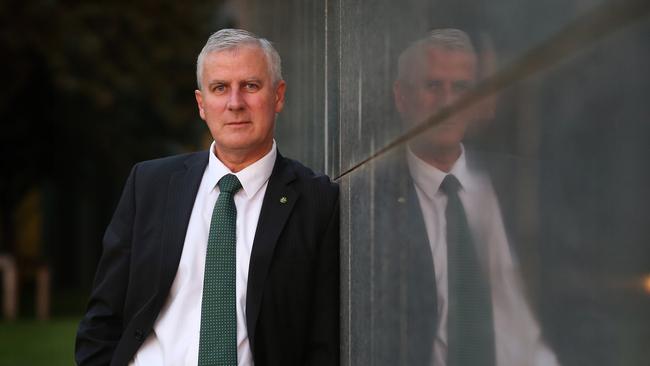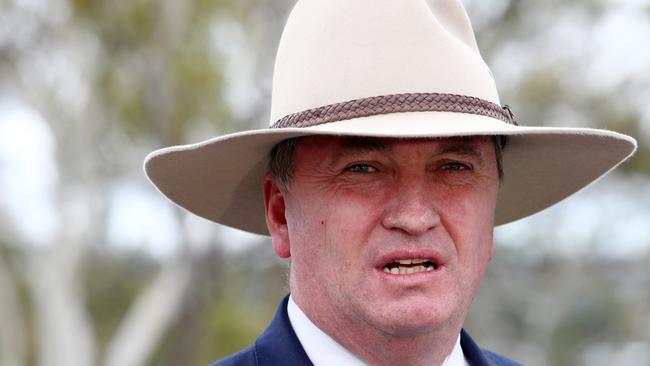Sorry still the hardest word to say, and hear
HOW many times must one person be forced to apologise, as Michael McCormack has, before we accept their sincerity as legitimate, asks Karen Brooks.
Rendezview
Don't miss out on the headlines from Rendezview. Followed categories will be added to My News.
LAST week, even before the new Nationals Leader and Deputy Prime Minister, Michael McCormack was announced, cruel and misinformed comments he made about the LGBTQI community back in 1993 were dredged up.
This was despite the fact he not only said sorry and spoke of how much his views had changed since then, but that he supported his constituents who voted “yes” in the Same Sex Marriage postal survey.
This hasn’t stopped some media commentators and activists recalling McCormack’s words and even publishing his editorial which described homosexuality as “sordid” and “unnatural” and blamed them for the spread of AIDS.
As offensive as I find McCormacks’ former views, they were published at a time when many others — in a pooling of ignorance and outright bigotry — shared them; not that this makes it right, but it does create a context.
Furthermore, this is something he did over twenty years ago. It’s almost as if there’s a statute of limitations on apologies. How long does one have to be sorry for? Especially when they’ve not only demonstrably altered their position but also don’t repeat the offence?
While what’s happened to McCormack is understandable in this day and age where everything we once said and did when we reach public office is examined as if it’s a Petri dish under a microscope, it does beg the question, when is an apology accepted or not?
The word ‘apology’ comes from the Greek and originally meant “something said or written in defence or justification of what appears to others to be wrong.” Clearly, it’s changed over time to mean “I’m sorry.”

Politicians, sportspeople and celebrities often apologise (Tiger Woods, Mel Gibson, Eddie Maguire, Sam Dastyari etc), offering a public mea culpa, or expression of fault and/or guilt to assuage the community and shore up a damaged reputation.
Lately, however, an apology has also come to mean “I’m sorry, not sorry” as well. Perhaps this is why we’ve become so cynical about them.
From a very young age, we’re taught to apologise for a range of things, petty or malicious — poor behaviour, bad manners, lying, deliberately or inadvertently hurting someone, etc. But when the words or actions are continued even after sorry is said, then the apology become meaningless.
The old adage, “actions speak louder than words” springs to mind.
Then there’s the non-apology, when a person says “I’m sorry you were hurt by my words or deeds.” They’re not sorry for what they did, but that you reacted in a specific way.
Other apologies leave the impression the offenders are only sorry they were caught.
When the Barnaby Joyce scandal hit the headlines, his apology didn’t attract the forgiveness he was hoping for. There’s a good reason for that. There can be a fine line between sincerity and insincerity. To many people, Joyce lacked the self-awareness and regret that should accompany a genuine apology — he didn’t appear to take responsibility for his actions. This was demonstrated by his bumbling attempts to deflect blame (for the discovery and questioning of the affair), namely on to the media and then conducting a “tell-all” interview with his lover, Vikki Campion when he was meant to be on leave.

According to research done at the University of Queensland Business School, while saying sorry can boost self-esteem by restoring a poor image and assuaging feelings of guilt, not saying sorry can give the wrongdoer a sense of power and be beneficial (for them) psychologically.
This might be why we witness so many fake apologies. Bogus apologies litter the landscape and are often drawn upon to minimise the fallout of homophobic, racist, and sexist remarks or actions.
There’s no doubt sincere apologies require a shift in the wrongdoer, a vulnerability as they both reflect upon and empathise with the other person’s experience. This is confronting and difficult to do. It’s why, when we’re in the wrong, we dread making them.
The most famous of Australian apologies would have to be Kevin Rudd’s to the Stolen Generations in 2008. This was regarded as a watershed moment that would foster a real spirit of reconciliation. Rudd said words were not enough and that actions must follow.
Something for which many are still waiting. As Luke Pearson writes for ABC, the “decade that has followed (the apology) could perhaps best be summed up as ‘one step forward, two steps back.’”
I would loathe being held to account for terrible things I said or did decades ago, especially if I apologised for them. I’m not certain why McCormack has been. Doing so serves little purpose except to cause embarrassment to him and pain to those he wrote about.
There’s a good reason sorry is the hardest word, but it’s also why, when it’s sincere, we really should try to forgive and forget.


